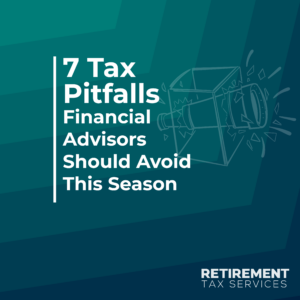Retirement Tax Planning through Capital Gains Harvesting
Capital gains can be an exciting topic. In simple terms, it means that investments worked out well for clients whose advisors recommend capital gains harvesting. IRS Topic 409 provides a more technical explanation. It covers the breadth of assets that can generate capital gains, including real estate, businesses, and equity investments.
Often, capital gains are discussed in the media in reference to selling stocks or other equity investments at a gain. However, the concept applies much more broadly. In this article, we are going to focus on capital gains and losses related to equity investments. As a result, we can shed light on why common recommendations around capital loss harvesting can be terrible advice.
I recently read an industry article on the topic: It included frequent capital loss harvesting as a perk of using a robo-advisor. This reinforces my need to cover the subject.
There are several important things to consider before recommending or implementing a tax loss harvesting strategy. They apply whether we are talking about a robo-advisor or real-life advisor; regardless of whether they are at a wirehouse, broker-dealer, or an independent RIA.
Stop Harvesting Losses
The following is a list of reasons why advisors focused on delivering value should stop doing tax loss harvesting:
Loss harvesting focuses attention on negative behavior.
Losses in a portfolio at times are inevitable. You should always be transparent about performance results. However, don’t highlight having losses in the portfolio as some kind of bonus so you can harvest capital losses. This is misleading and a disservice to your client.
Offsetting income with failed investments is not a winning strategy. It’s not even a very good consolation prize: Harvesting a loss will reduce your income tax in that year, but you still would have been better off with a gain!
If my options are to either lose $1,000 to save $220 in taxes (assuming a 22% tax bracket) or NOT lose $1,000 and pay the $220 in taxes, I’m going to pay the taxes every time. Therefore I come out $780 ahead. Quit trying to convince clients or yourself that they are better off losing money!
Loss harvesting lowers basis—and potentially creates higher tax liability in future years.
There’s a difference between tax loss harvesting and simply getting out of the market: With tax loss harvesting, advisors recommend capital gains harvesting to the client and use the proceeds to purchase similar investments.
This keeps their portfolio balanced. Considering one year at a time will technically help the client pay less in taxes this year, but not over their lifetime. Selling investments and then using proceeds to get right back into the market resets their basis at a lower amount.
In addition, it creates a larger taxable gain in the future. Great advisors look at their client’s lifetime bill when making these types of decisions. Don’t just review the current year.
Loss harvesting is an almost foolproof method for making your client’s tax preparer really angry.
This applies to all advisors, but especially to those who hold to the company line of “We don’t do tax planning.”
Your client’s tax preparer would beg to differ (although they might agree that you don’t do it well). The IRS wants their piece of everything your client does, including investment activity. If you are helping a client buy and sell investments, you’ve already impacted their tax planning.
Now it’s up to you to take responsibility for that and do it well. Proactively work with your client’s tax preparer during the year. Don’t just leave it to them to sort out come tax time. Otherwise, what possible motivation would they have for not blaming added tax payments or timing delays on you?
Additional costs to tax loss harvesting get left out of consideration.
Investment sales at a loss are subject to the IRS wash sale (IRS Publication 550) rule. That’s in addition to any transaction costs incurred for the investment sales and purchases.
The wash sale rule prevents an investor who’s selling at a loss from buying that same investment within 30 days. This when advisors recommend capital gains harvesting, they will miss out on market activity for at least 30 days.
You can of course have them purchase something similar, but this should be part of the conversation.
Gains harvesting increases your basis and reduces tax liability in future years.
This has the most value in lower-income years, relative to future expectations. Anytime a taxpayer is in the 0% capital gains bracket (in 2021 up to $40,400 for single filers and up to $80,800 for married filing jointly; MFJ), this is almost a no-brainer.
Even in the 15% bracket, there is an opportunity, depending on expected income levels in the future. While the 15% bracket goes up to $445,850 for single filers and $501,600 for MFJ, the Net Investment Income Tax (NIIT) kicks in at $250,000 for MFJ. It starts at $200,000 for single filers and adds 3.8% to the capital gains tax rate.
In contrast to selling investments at a loss, there is no wash sale rule (IRS Publication 550) for investments sold at a gain. When selling investments at a gain, an investor could sell their stock in a company and then immediately repurchase it at the same price.
This means there is no impact on the investor’s overall return. However, they have increased their basis and reduced the amount of taxable gain in the future.
Take Action
Here is what every great advisor should be doing:
- Get tax returns for every client every year. This will give you accurate background for where the client is relative to the various tax brackets. It will also help you know where planning opportunities are for capital gains harvesting in a given year.
- Perform annual and lifetime tax projections for your clients. Do this anytime you are making recommendations that might have a tax impact (which is more often than you might think).
- Make sure clients know that you want to be part of the tax planning conversation with them. Suppose your primary care doctor referred you to a specialist: Wouldn’t you want the specialist coordinating with your doc before and after any procedures? Same idea with financial services professionals.
Great advisors provide value in all aspects of their clients’ financial lives. CPAs do not have exclusive rights on all things tax-related. Many of them will thank you for taking these steps with your shared clients.
Even if you find yourself in a situation beyond your expertise, you can still serve your client. Provide value through partnering with them to work with a tax expert. Don’t just sit back and say, “Sorry, I don’t give tax advice.”
Good luck out there and remember: Tip your server, not the IRS.





